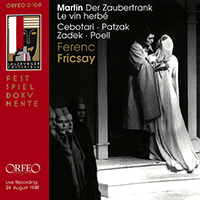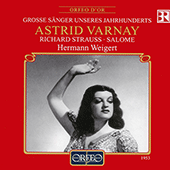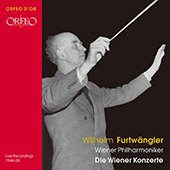Julius Patzak
Patzak came from a solid middle-class family: his father, grandfather and great-grandfather had all been schoolteachers. After he had completed his own formal schooling, he undertook military service in Serbia. Acting on the advice of his father he then became a civil servant, working in the office of Vienna’s Youth Council; while at the same time, with the intention of becoming a conductor, he enrolled at the University of Vienna to study composition and conducting. His teachers included Franz Schmidt, Guido Adler, Egon Wellesz and Eusebius Mandyczewski.
After Patzak was heard performing in an amateur concert of the Viennese Schubert Society, despite having received no formal training as a singer he was offered and accepted a contract with the Liberec (Reichenberg) Theatre in Bohemia. He made his operatic stage debut there as Radamès / Aida in 1926 and during the following season, 1927–1928, was a member of the Brno (Brünn) Opera; after which he joined the Bavarian State Opera in Munich in 1928, remaining one of this company’s leading tenors until 1945.
During the 1930s Patzak established himself as a distinguished interpreter of Mozart’s operas, in which he sang regularly at the summer Munich Festival. He also appeared in numerous first performances at Munich, including Pfitzner’s Das Herz (1931), Richard Strauss’s Friedenstag (1938) and Carl Orff’s Der Mond (1939). He was a member of the Munich company which toured to La Scala, Milan in 1938 and himself appeared as a guest at Amsterdam (1932, 1934), Copenhagen (1934, 1939), Budapest, Zürich and Prague (1937) and Antwerp (1939).
After World War II Patzak joined the Vienna State Opera in 1945, remaining there until 1960. He had first appeared at the Salzburg Festival in 1938 and sang there frequently: as Belmonte / Die Entführung aus dem Serail (1941, 1945), Tamino (1943), Elemer / Arabella (1947), Florestan / Fidelio (1948), Tito / La clemenza di Tito (1949, 1950) and the Chorus / The Rape of Lucretia (1950). He also took part in the first performances at Salzburg of Gottfried von Einem’s Dantons Tod (1947) and Frank Martin’s Le vin herbé (1948), and had a major speaking role in the 1961 and 1962 productions of Hoffmansthal’s play Everyman.
At the Royal Opera House, London Patzak sang Tamino / Die Zauberflöte on his debut in 1938, returning there in 1947 as a member of the visiting Vienna State Opera, singing Herod / Salome and Florestan, a role which he also sang with the young Covent Garden Opera Company in 1951, 1952 and 1954. His only appearance in America was at the Cincinnati May Festival of 1954, with Josef Krips conducting.
Other roles with which Patzak was particularly associated were the title parts in Pfitzner’s Palestrina and Offenbach’s Les Contes d’Hoffmann (indicating his range as both singer and actor); he was also a fine Lohengrin, a distinguished exponent of the major tenor parts in Bach’s St John Passion, Mahler’s Das Lied von der Erde and Franz Schmidt’s Das Buch mit sieben Siegeln and a singer of unparalleled charm and wit in Viennese operettas and Heurigen songs.
From 1948 Patzak was a respected teacher at the Vienna Academy and from 1962 to 1966 at the Salzburg Mozarteum. Towards the end of his career he also occasionally returned to conducting.
Although his voice was neither large nor especially powerful, Patzak was a commanding singer with elegant phrasing, superb enunciation and effective stage presence. Above all he was one of the most musical singers of his generation, possessing an innate sense of appropriate taste.
© Naxos Rights International Ltd. — David Patmore (A–Z of Singers, Naxos 8.558097-100).



















